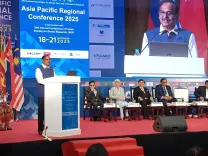Is Repression in China a Political Necessity and a Lucrative Business?

Synopsis
Key Takeaways
- Geedge Networks markets itself as a cybersecurity firm while building surveillance systems.
- GoLaxy leverages AI to influence online narratives.
- Both companies support China’s dual strategy of domestic control and international influence.
- Geedge’s tools have been deployed in several countries seeking authoritarian control.
- Close ties to CAS highlight the state's involvement in these enterprises.
New Delhi, Sep 20 (NationPress) Leaked documents from two Chinese firms — Geedge Networks, an infrastructure builder, and GoLaxy, an AI company — have unveiled how repression in China serves both as a political necessity and a lucrative enterprise. This highlights that the nation is not merely enhancing digital authoritarianism within its borders but is also marketing it internationally, as reported by The Diplomat.
The internal files leaked from Geedge Networks showcase how the company marketed itself as a cybersecurity provider while actually constructing censorship and surveillance infrastructure.
GoLaxy was brought to light when researchers at Vanderbilt University discovered nearly 400 pages of internal planning documentation. This Beijing-based firm has become a significant player in deploying AI tools that monitor, influence, and manipulate online narratives.
“These leaks have provided an unparalleled insight into the workings of China’s censorship and propaganda machinery,” the report added.
It further elaborated that while the products they offer are distinct, they synergize within the broader control system.
“Geedge acts as an infrastructure developer. Its flagship product, the Tiangou Secure Gateway, functions as a comprehensive firewall system. It conducts deep packet inspections, blocks VPNs, fingerprints devices, analyzes metadata, and even provides prototype reputation-based access controls, as outlined in the report.
The systems developed by GoLaxy utilize open-source social media data, map relationships among political figures and influencers, and harness artificial intelligence to create content for orchestrated campaigns.
“Dashboards enable operators to track conversations surrounding sensitive subjects — including Taiwan, Hong Kong, Xinjiang, and U.S. politics — and strategize interventions by seeding narratives or amplifying preferred voices. Where Geedge constructs the pipelines for information control, GoLaxy floods those pipelines with content aligned to government objectives,” the report from The Diplomat explained.
Geedge has even expanded its reach internationally, marketing its “Great Firewall in a box” to governments seeking Chinese-style control. Reports indicate deployments in Kazakhstan, Pakistan, Ethiopia, and Myanmar.
“In contrast, GoLaxy has not yet widely exported its tools to foreign governments; instead, it concentrates on bolstering the CCP’s domestic propaganda machine and enhancing capabilities for global influence campaigns,” the report stated.
The findings illustrate how both companies embody the party-state’s dual strategy — perfecting control domestically while promoting their model abroad.
Both firms maintain strong connections to the Chinese Academy of Sciences (CAS), the country’s leading research institution. This underscores that China has transformed repression into a thriving export industry, the report emphasized.








